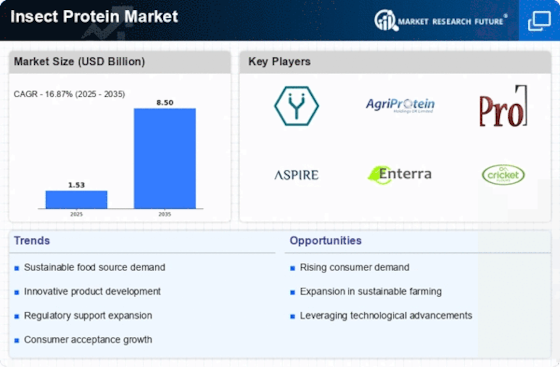Animal Feed
Food Products
Nutraceuticals
Bioplastics
Crickets
Mealworms
Black Soldier Fly
Grasshoppers
Ants
Livestock
Aquaculture
Pet Food
Human Consumption
Whole Insects
Insect Powder
Insect Oil
Insect Protein Bars
North America
Europe
South America
Asia Pacific
Middle East and Africa
North America Outlook (USD Billion, 2019-2035)
North America Insect Protein Market by Application Type
Animal Feed
Food Products
Nutraceuticals
Bioplastics
North America Insect Protein Market by Insect Type
Crickets
Mealworms
Black Soldier Fly
Grasshoppers
Ants
North America Insect Protein Market by End Use Type
Livestock
Aquaculture
Pet Food
Human Consumption
North America Insect Protein Market by Form Type
Whole Insects
Insect Powder
Insect Oil
Insect Protein Bars
North America Insect Protein Market by Regional Type
US
Canada
US Outlook (USD Billion, 2019-2035)
US Insect Protein Market by Application Type
Animal Feed
Food Products
Nutraceuticals
Bioplastics
US Insect Protein Market by Insect Type
Crickets
Mealworms
Black Soldier Fly
Grasshoppers
Ants
US Insect Protein Market by End Use Type
Livestock
Aquaculture
Pet Food
Human Consumption
US Insect Protein Market by Form Type
Whole Insects
Insect Powder
Insect Oil
Insect Protein Bars
CANADA Outlook (USD Billion, 2019-2035)
CANADA Insect Protein Market by Application Type
Animal Feed
Food Products
Nutraceuticals
Bioplastics
CANADA Insect Protein Market by Insect Type
Crickets
Mealworms
Black Soldier Fly
Grasshoppers
Ants
CANADA Insect Protein Market by End Use Type
Livestock
Aquaculture
Pet Food
Human Consumption
CANADA Insect Protein Market by Form Type
Whole Insects
Insect Powder
Insect Oil
Insect Protein Bars
Europe Outlook (USD Billion, 2019-2035)
Europe Insect Protein Market by Application Type
Animal Feed
Food Products
Nutraceuticals
Bioplastics
Europe Insect Protein Market by Insect Type
Crickets
Mealworms
Black Soldier Fly
Grasshoppers
Ants
Europe Insect Protein Market by End Use Type
Livestock
Aquaculture
Pet Food
Human Consumption
Europe Insect Protein Market by Form Type
Whole Insects
Insect Powder
Insect Oil
Insect Protein Bars
Europe Insect Protein Market by Regional Type
Germany
UK
France
Russia
Italy
Spain
Rest of Europe
GERMANY Outlook (USD Billion, 2019-2035)
GERMANY Insect Protein Market by Application Type
Animal Feed
Food Products
Nutraceuticals
Bioplastics
GERMANY Insect Protein Market by Insect Type
Crickets
Mealworms
Black Soldier Fly
Grasshoppers
Ants
GERMANY Insect Protein Market by End Use Type
Livestock
Aquaculture
Pet Food
Human Consumption
GERMANY Insect Protein Market by Form Type
Whole Insects
Insect Powder
Insect Oil
Insect Protein Bars
UK Outlook (USD Billion, 2019-2035)
UK Insect Protein Market by Application Type
Animal Feed
Food Products
Nutraceuticals
Bioplastics
UK Insect Protein Market by Insect Type
Crickets
Mealworms
Black Soldier Fly
Grasshoppers
Ants
UK Insect Protein Market by End Use Type
Livestock
Aquaculture
Pet Food
Human Consumption
UK Insect Protein Market by Form Type
Whole Insects
Insect Powder
Insect Oil
Insect Protein Bars
FRANCE Outlook (USD Billion, 2019-2035)
FRANCE Insect Protein Market by Application Type
Animal Feed
Food Products
Nutraceuticals
Bioplastics
FRANCE Insect Protein Market by Insect Type
Crickets
Mealworms
Black Soldier Fly
Grasshoppers
Ants
FRANCE Insect Protein Market by End Use Type
Livestock
Aquaculture
Pet Food
Human Consumption
FRANCE Insect Protein Market by Form Type
Whole Insects
Insect Powder
Insect Oil
Insect Protein Bars
RUSSIA Outlook (USD Billion, 2019-2035)
RUSSIA Insect Protein Market by Application Type
Animal Feed
Food Products
Nutraceuticals
Bioplastics
RUSSIA Insect Protein Market by Insect Type
Crickets
Mealworms
Black Soldier Fly
Grasshoppers
Ants
RUSSIA Insect Protein Market by End Use Type
Livestock
Aquaculture
Pet Food
Human Consumption
RUSSIA Insect Protein Market by Form Type
Whole Insects
Insect Powder
Insect Oil
Insect Protein Bars
ITALY Outlook (USD Billion, 2019-2035)
ITALY Insect Protein Market by Application Type
Animal Feed
Food Products
Nutraceuticals
Bioplastics
ITALY Insect Protein Market by Insect Type
Crickets
Mealworms
Black Soldier Fly
Grasshoppers
Ants
ITALY Insect Protein Market by End Use Type
Livestock
Aquaculture
Pet Food
Human Consumption
ITALY Insect Protein Market by Form Type
Whole Insects
Insect Powder
Insect Oil
Insect Protein Bars
SPAIN Outlook (USD Billion, 2019-2035)
SPAIN Insect Protein Market by Application Type
Animal Feed
Food Products
Nutraceuticals
Bioplastics
SPAIN Insect Protein Market by Insect Type
Crickets
Mealworms
Black Soldier Fly
Grasshoppers
Ants
SPAIN Insect Protein Market by End Use Type
Livestock
Aquaculture
Pet Food
Human Consumption
SPAIN Insect Protein Market by Form Type
Whole Insects
Insect Powder
Insect Oil
Insect Protein Bars
REST OF EUROPE Outlook (USD Billion, 2019-2035)
REST OF EUROPE Insect Protein Market by Application Type
Animal Feed
Food Products
Nutraceuticals
Bioplastics
REST OF EUROPE Insect Protein Market by Insect Type
Crickets
Mealworms
Black Soldier Fly
Grasshoppers
Ants
REST OF EUROPE Insect Protein Market by End Use Type
Livestock
Aquaculture
Pet Food
Human Consumption
REST OF EUROPE Insect Protein Market by Form Type
Whole Insects
Insect Powder
Insect Oil
Insect Protein Bars
APAC Outlook (USD Billion, 2019-2035)
APAC Insect Protein Market by Application Type
Animal Feed
Food Products
Nutraceuticals
Bioplastics
APAC Insect Protein Market by Insect Type
Crickets
Mealworms
Black Soldier Fly
Grasshoppers
Ants
APAC Insect Protein Market by End Use Type
Livestock
Aquaculture
Pet Food
Human Consumption
APAC Insect Protein Market by Form Type
Whole Insects
Insect Powder
Insect Oil
Insect Protein Bars
APAC Insect Protein Market by Regional Type
China
India
Japan
South Korea
Malaysia
Thailand
Indonesia
Rest of APAC
CHINA Outlook (USD Billion, 2019-2035)
CHINA Insect Protein Market by Application Type
Animal Feed
Food Products
Nutraceuticals
Bioplastics
CHINA Insect Protein Market by Insect Type
Crickets
Mealworms
Black Soldier Fly
Grasshoppers
Ants
CHINA Insect Protein Market by End Use Type
Livestock
Aquaculture
Pet Food
Human Consumption
CHINA Insect Protein Market by Form Type
Whole Insects
Insect Powder
Insect Oil
Insect Protein Bars
INDIA Outlook (USD Billion, 2019-2035)
INDIA Insect Protein Market by Application Type
Animal Feed
Food Products
Nutraceuticals
Bioplastics
INDIA Insect Protein Market by Insect Type
Crickets
Mealworms
Black Soldier Fly
Grasshoppers
Ants
INDIA Insect Protein Market by End Use Type
Livestock
Aquaculture
Pet Food
Human Consumption
INDIA Insect Protein Market by Form Type
Whole Insects
Insect Powder
Insect Oil
Insect Protein Bars
JAPAN Outlook (USD Billion, 2019-2035)
JAPAN Insect Protein Market by Application Type
Animal Feed
Food Products
Nutraceuticals
Bioplastics
JAPAN Insect Protein Market by Insect Type
Crickets
Mealworms
Black Soldier Fly
Grasshoppers
Ants
JAPAN Insect Protein Market by End Use Type
Livestock
Aquaculture
Pet Food
Human Consumption
JAPAN Insect Protein Market by Form Type
Whole Insects
Insect Powder
Insect Oil
Insect Protein Bars
SOUTH KOREA Outlook (USD Billion, 2019-2035)
SOUTH KOREA Insect Protein Market by Application Type
Animal Feed
Food Products
Nutraceuticals
Bioplastics
SOUTH KOREA Insect Protein Market by Insect Type
Crickets
Mealworms
Black Soldier Fly
Grasshoppers
Ants
SOUTH KOREA Insect Protein Market by End Use Type
Livestock
Aquaculture
Pet Food
Human Consumption
SOUTH KOREA Insect Protein Market by Form Type
Whole Insects
Insect Powder
Insect Oil
Insect Protein Bars
MALAYSIA Outlook (USD Billion, 2019-2035)
MALAYSIA Insect Protein Market by Application Type
Animal Feed
Food Products
Nutraceuticals
Bioplastics
MALAYSIA Insect Protein Market by Insect Type
Crickets
Mealworms
Black Soldier Fly
Grasshoppers
Ants
MALAYSIA Insect Protein Market by End Use Type
Livestock
Aquaculture
Pet Food
Human Consumption
MALAYSIA Insect Protein Market by Form Type
Whole Insects
Insect Powder
Insect Oil
Insect Protein Bars
THAILAND Outlook (USD Billion, 2019-2035)
THAILAND Insect Protein Market by Application Type
Animal Feed
Food Products
Nutraceuticals
Bioplastics
THAILAND Insect Protein Market by Insect Type
Crickets
Mealworms
Black Soldier Fly
Grasshoppers
Ants
THAILAND Insect Protein Market by End Use Type
Livestock
Aquaculture
Pet Food
Human Consumption
THAILAND Insect Protein Market by Form Type
Whole Insects
Insect Powder
Insect Oil
Insect Protein Bars
INDONESIA Outlook (USD Billion, 2019-2035)
INDONESIA Insect Protein Market by Application Type
Animal Feed
Food Products
Nutraceuticals
Bioplastics
INDONESIA Insect Protein Market by Insect Type
Crickets
Mealworms
Black Soldier Fly
Grasshoppers
Ants
INDONESIA Insect Protein Market by End Use Type
Livestock
Aquaculture
Pet Food
Human Consumption
INDONESIA Insect Protein Market by Form Type
Whole Insects
Insect Powder
Insect Oil
Insect Protein Bars
REST OF APAC Outlook (USD Billion, 2019-2035)
REST OF APAC Insect Protein Market by Application Type
Animal Feed
Food Products
Nutraceuticals
Bioplastics
REST OF APAC Insect Protein Market by Insect Type
Crickets
Mealworms
Black Soldier Fly
Grasshoppers
Ants
REST OF APAC Insect Protein Market by End Use Type
Livestock
Aquaculture
Pet Food
Human Consumption
REST OF APAC Insect Protein Market by Form Type
Whole Insects
Insect Powder
Insect Oil
Insect Protein Bars
South America Outlook (USD Billion, 2019-2035)
South America Insect Protein Market by Application Type
Animal Feed
Food Products
Nutraceuticals
Bioplastics
South America Insect Protein Market by Insect Type
Crickets
Mealworms
Black Soldier Fly
Grasshoppers
Ants
South America Insect Protein Market by End Use Type
Livestock
Aquaculture
Pet Food
Human Consumption
South America Insect Protein Market by Form Type
Whole Insects
Insect Powder
Insect Oil
Insect Protein Bars
South America Insect Protein Market by Regional Type
Brazil
Mexico
Argentina
Rest of South America
BRAZIL Outlook (USD Billion, 2019-2035)
BRAZIL Insect Protein Market by Application Type
Animal Feed
Food Products
Nutraceuticals
Bioplastics
BRAZIL Insect Protein Market by Insect Type
Crickets
Mealworms
Black Soldier Fly
Grasshoppers
Ants
BRAZIL Insect Protein Market by End Use Type
Livestock
Aquaculture
Pet Food
Human Consumption
BRAZIL Insect Protein Market by Form Type
Whole Insects
Insect Powder
Insect Oil
Insect Protein Bars
MEXICO Outlook (USD Billion, 2019-2035)
MEXICO Insect Protein Market by Application Type
Animal Feed
Food Products
Nutraceuticals
Bioplastics
MEXICO Insect Protein Market by Insect Type
Crickets
Mealworms
Black Soldier Fly
Grasshoppers
Ants
MEXICO Insect Protein Market by End Use Type
Livestock
Aquaculture
Pet Food
Human Consumption
MEXICO Insect Protein Market by Form Type
Whole Insects
Insect Powder
Insect Oil
Insect Protein Bars
ARGENTINA Outlook (USD Billion, 2019-2035)
ARGENTINA Insect Protein Market by Application Type
Animal Feed
Food Products
Nutraceuticals
Bioplastics
ARGENTINA Insect Protein Market by Insect Type
Crickets
Mealworms
Black Soldier Fly
Grasshoppers
Ants
ARGENTINA Insect Protein Market by End Use Type
Livestock
Aquaculture
Pet Food
Human Consumption
ARGENTINA Insect Protein Market by Form Type
Whole Insects
Insect Powder
Insect Oil
Insect Protein Bars
REST OF SOUTH AMERICA Outlook (USD Billion, 2019-2035)
REST OF SOUTH AMERICA Insect Protein Market by Application Type
Animal Feed
Food Products
Nutraceuticals
Bioplastics
REST OF SOUTH AMERICA Insect Protein Market by Insect Type
Crickets
Mealworms
Black Soldier Fly
Grasshoppers
Ants
REST OF SOUTH AMERICA Insect Protein Market by End Use Type
Livestock
Aquaculture
Pet Food
Human Consumption
REST OF SOUTH AMERICA Insect Protein Market by Form Type
Whole Insects
Insect Powder
Insect Oil
Insect Protein Bars
MEA Outlook (USD Billion, 2019-2035)
MEA Insect Protein Market by Application Type
Animal Feed
Food Products
Nutraceuticals
Bioplastics
MEA Insect Protein Market by Insect Type
Crickets
Mealworms
Black Soldier Fly
Grasshoppers
Ants
MEA Insect Protein Market by End Use Type
Livestock
Aquaculture
Pet Food
Human Consumption
MEA Insect Protein Market by Form Type
Whole Insects
Insect Powder
Insect Oil
Insect Protein Bars
MEA Insect Protein Market by Regional Type
GCC Countries
South Africa
Rest of MEA
GCC COUNTRIES Outlook (USD Billion, 2019-2035)
GCC COUNTRIES Insect Protein Market by Application Type
Animal Feed
Food Products
Nutraceuticals
Bioplastics
GCC COUNTRIES Insect Protein Market by Insect Type
Crickets
Mealworms
Black Soldier Fly
Grasshoppers
Ants
GCC COUNTRIES Insect Protein Market by End Use Type
Livestock
Aquaculture
Pet Food
Human Consumption
GCC COUNTRIES Insect Protein Market by Form Type
Whole Insects
Insect Powder
Insect Oil
Insect Protein Bars
SOUTH AFRICA Outlook (USD Billion, 2019-2035)
SOUTH AFRICA Insect Protein Market by Application Type
Animal Feed
Food Products
Nutraceuticals
Bioplastics
SOUTH AFRICA Insect Protein Market by Insect Type
Crickets
Mealworms
Black Soldier Fly
Grasshoppers
Ants
SOUTH AFRICA Insect Protein Market by End Use Type
Livestock
Aquaculture
Pet Food
Human Consumption
SOUTH AFRICA Insect Protein Market by Form Type
Whole Insects
Insect Powder
Insect Oil
Insect Protein Bars
REST OF MEA Outlook (USD Billion, 2019-2035)
REST OF MEA Insect Protein Market by Application Type
Animal Feed
Food Products
Nutraceuticals
Bioplastics
REST OF MEA Insect Protein Market by Insect Type
Crickets
Mealworms
Black Soldier Fly
Grasshoppers
Ants
REST OF MEA Insect Protein Market by End Use Type
Livestock
Aquaculture
Pet Food
Human Consumption
REST OF MEA Insect Protein Market by Form Type
Whole Insects
Insect Powder
Insect Oil
Insect Protein Bars


















Leave a Comment